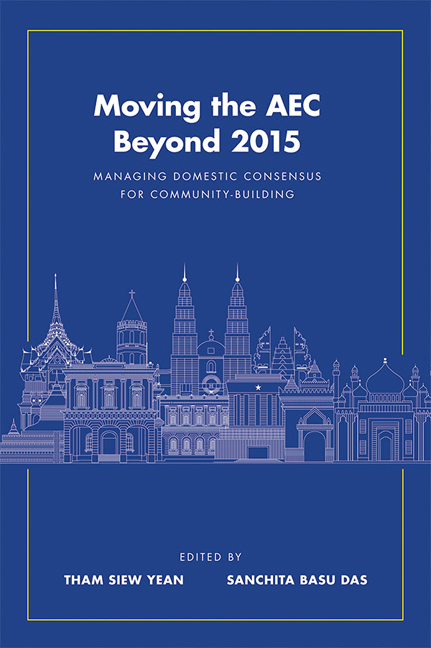Book contents
- Frontmatter
- Contents
- Foreword
- Preface
- Acknowledgements
- Abbreviations
- About the Contributors
- 1 Introduction: Economic Interests and the ASEAN Economic Community
- 2 ASEAN Economic Cooperation and Its Political Realities
- 3 Indonesia's Implementation of Facilitation and Harmonization Measures under the AEC
- 4 The AEC and Domestic Challenges in Malaysia: Examining the Liberalization of Services in AFAS
- 5 The Philippines and the AEC Beyond 2015: Managing Domestic Challenges
- 6 The AEC Beyond 2015: Implementation and Challenges for Singapore
- 7 Moving the AEC Beyond 2015: Managing Domestic Economic Interests in Thailand
- 8 Managing Domestic Consensus for ASEAN Community Building in Vietnam
- Index
Preface
Published online by Cambridge University Press: 06 January 2018
- Frontmatter
- Contents
- Foreword
- Preface
- Acknowledgements
- Abbreviations
- About the Contributors
- 1 Introduction: Economic Interests and the ASEAN Economic Community
- 2 ASEAN Economic Cooperation and Its Political Realities
- 3 Indonesia's Implementation of Facilitation and Harmonization Measures under the AEC
- 4 The AEC and Domestic Challenges in Malaysia: Examining the Liberalization of Services in AFAS
- 5 The Philippines and the AEC Beyond 2015: Managing Domestic Challenges
- 6 The AEC Beyond 2015: Implementation and Challenges for Singapore
- 7 Moving the AEC Beyond 2015: Managing Domestic Economic Interests in Thailand
- 8 Managing Domestic Consensus for ASEAN Community Building in Vietnam
- Index
Summary
As ASEAN reached its milestone of December 2015, there is immense debate on the state of regional integration. While member countries have made commitments to the regional goals and targets of an ASEAN Economic Community (AEC), they continue to face hurdles in the effective implementation of their commitments in their respective domestic economies. This slows down the entire process of ASEAN Community- Building, thereby limiting the realization of the full potential of the ASEAN Leaders’ vision, envisaged in 1997, of “a stable, prosperous and highly competitive ASEAN economic region in which there is a free flow of goods, services, investment and freer flow of capital, equitable economic development and reduced poverty and socioeconomic disparities”.
Given this scenario, we thought it is important and useful to undertake a study that can illuminate the academics, policymakers and ordinary citizens on implementation issues in member countries. Our reading of the literature and discussions with fellow researchers and domestic stakeholders in different countries led us to conjecture that domestic conflict may be an important source of implementation problems. We found that these domestic conflicts can take several forms in ASEAN countries ranging from macro-level policy-making to firmlevel perception of winners and losers from the establishment of AEC. As ASEAN members are very different from each other, the nature of domestic conflicts also varies depending on the economic structure of the country, its stage of development, degree of openness to the global economy and its development goals and priorities. It is important to understand the nature of conflict and identify the winners and losers so that the member economies can formulate appropriate domestic policies for deeper economic integration in ASEAN beyond 2015.
In order to meet the objective of the study, we gathered Southeast Asian experts to discuss about six selected countries of ASEAN — Indonesia, Malaysia, the Philippines, Singapore, Thailand and Vietnam. We also thought it is important to incorporate some discussions at the regional level to foster an understanding of the overall perspective and how it is determined as this will provide a backdrop to the country studies.
It should be noted that part of this book volume is already published as a journal issue — Journal of Southeast Asian Economies (JSEAE), vol. 32, no. 2. Special Focus on “Moving the AEC Beyond 2015: Managing Domestic Consensus for Community-Building” — in August 2015.
- Type
- Chapter
- Information
- Moving the AEC Beyond 2015Managing Domestic Consensus for Community-Building, pp. xi - xiiPublisher: ISEAS–Yusof Ishak InstitutePrint publication year: 2016

